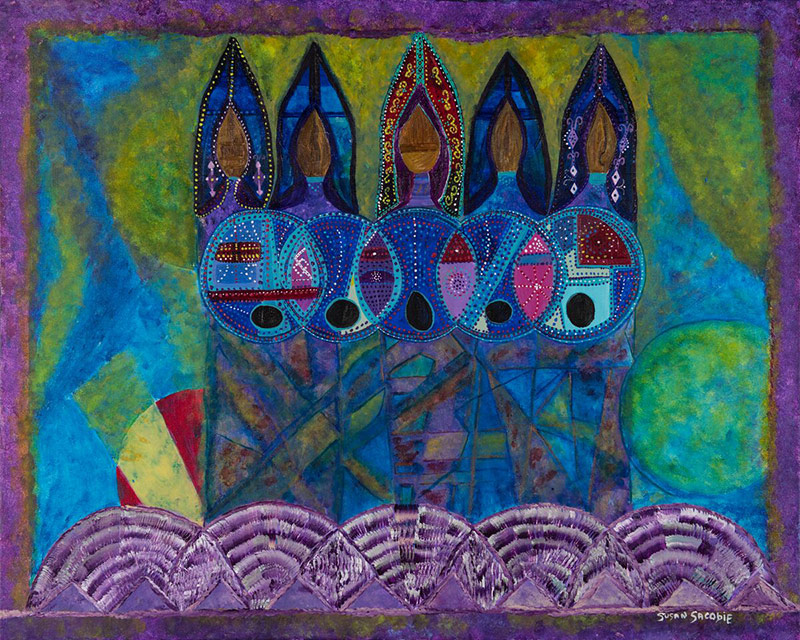Helpline launched for loved ones of missing Indigenous people in New Brunswick
Author: UNB Newsroom
Posted on Apr 2, 2019
Category: UNB Fredericton , UNB Saint John

A new helpline will assist families and friends of missing Indigenous people in New Brunswick navigate police, media and justice systems in an effort to find their loved ones and bring them home safely.
The helpline is the latest resource developed in a collaboration between UNB law professor Dr. Jula Hughes, the New Brunswick Aboriginal Peoples Council and Gignoo Transition House. The project, “Looking out for each other: Assisting Aboriginal families and communities when an Aboriginal woman goes missing,” is seeking ways to prevent victimization and improve outcomes for missing Indigenous people including women, girls and sexual and gender minorities in Eastern Canada.
“The helpline will be an important way for us to take back control over our lives and bring home our missing friends and family members,” says Amanda LeBlanc, interim president and Chief of the New Brunswick Aboriginal Peoples Council.
A key concern was to create a helpline that would be sustainable and accessible 24/7. Gignoo Transition House, New Brunswick’s only Aboriginal transition house, offered their services.
“We bring 25 years of experience in providing supports to Indigenous women to the project. Indigenous women have always been leaders in our communities, and this project is a good example,” says Barb Martin, president of Gignoo Transition House.
“Every day people go missing, and every day families need supports to help them figure out what to do and to navigate services. Our Aboriginal partner organizations are best situated to provide these supports,” says Dr. Hughes.
In Canada, Indigenous women are 12 times more likely to be missing or murdered than any other women. According to the Status of Women Canada, Indigenous women and girls in Canada are disproportionately affected by all forms of violence.
The New Brunswick Aboriginal Peoples Council approached Dr. Hughes in 2015 for help on the project. The initiative combines university-based research, Indigenous self-governance organizations, social justice efforts, and justice system reform.
“There’s been quite a bit of research done over time about Aboriginal people, but not a lot of research is done by, with and for Aboriginal people,” says Dr. Hughes. “A lot of research seemed to approach it from the perspective of ‘there’s something wrong with you.’ Indigenous people and organizations are rightfully pushing back against that. Aboriginal organizations have questions about better policing procedures, addressing racism in public services, and how to achieve more appropriate media reporting, and this research is taking inspiration from these questions.”
Dr. Hughes coordinates the research component of the project, pairing researchers who can produce the required resources with Aboriginal organizations seeking to provide services to families and friends of missing persons. Project resources include things like helplines, cultural competency training for professionals and informational pamphlets for community members on issues like interacting with police and lawyers.
“Making sure people get accurate and up-to-date legal and social service information is important, as is bridging the trust gap between mainstream service providers and Indigenous people,” says Dr. Hughes. “Talking to a lawyer doesn’t mean you’ve gotten yourself in trouble, and a culturally competent lawyer will be able to offer information and assistance.”
The team has consulted with community partners to identify existing resources within urban Indigenous organizations and what future tools could address their needs. One of the resources identified was the need for a helpline for families and friends to advise on issues like interactions with police and media, and the use of social media.
The inputs that shape the project resources come from sharing circles, where Aboriginal people and organizations, on- and off-reserve, shed light on experiences they’ve had with missing persons cases, policing and media in Eastern Canadian jurisdictions. Community members direct the research by sharing their stories and lending their expertise to the research teams. Through the circles, Dr. Hughes and her team find out what resources and actions are needed.
UNB is partnered with universities and organizations across Eastern Canada, including a group of researchers at Memorial University developing cultural competency training for professionals interacting with Indigenous people, and a team from Université du Québec à Montréal working to create support resources for the families of sex work-related and human trafficking-related missing persons in Montreal.
“Building and sustaining relationships where Indigenous people can access supports and be confident that they’ll get services from somebody who is knowledgeable about Indigenous communities and where they won’t be facing racist responses is important,” says Dr. Hughes.
The number for the helpline is 1-833-MMI-FIND, which stands for Missing and Murdered Indigenous Families in Need of Direction. This 24/7 helpline is the first of its kind in the Maritimes and is now live.
Media contact: Kelsey Pye
